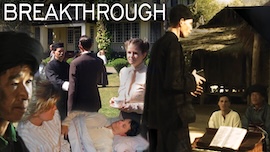Isobel Kuhn Tested God and Found an ENDURING Faith

[In the Arena, one of Isobel Kuhn's best-known writings]
A VANCOUVER COLLEGE PROFESSOR sneered at Isobel Miller for her belief in Bible teachings. “You just believe that because your papa and mama told you so.” Perhaps he was right, she thought. Miller decided to believe only those “theories of life” that she had personally validated. She stopped rising early to read her Bible and quit going to church. She joined a drama club and, when not acting or studying, danced late into the night. She became engaged to a World War I veteran.
The veteran betrayed her. Broken hearted, Miller found herself unable to sleep night after weary night. In December, around her twentieth birthday, she could bear her misery no longer. She rose from her sleepless bed intending to poison herself. Hearing her father groan in his sleep, she paused. If she killed herself, he would think she was in hell. She couldn’t do that to him. A line from Dante came to mind: “In his will is our peace.”
“God, if there be a God,” she whispered, “if You will prove to me that You are, and if You will give me peace, I will give You my whole life. I'll do anything You ask me to do, go where You send me, obey You all my days.” She slept deeply that night as she had not slept in weeks.
The rest of Miller’s life would be spent fulfilling her end of the bargain and proving God faithful in varied circumstances. She wrote half a dozen books documenting his hand upon her life and the lives of friends. (These bear her married name, Isobel Kuhn.) In spite of family opposition, scarce funds, and overwork she studied to become a missionary with the goal of working among the Lisu tribes of Southern China.
Isobel and her husband, John Kuhn, suffered many hardships. Often they were separated from each other and from their children. Sickness, pain, deprivation of Western culture, lack of privacy, overwork, and revolting foods were daily burdens. But through prayer, fasting, steady work, and intelligent innovation the pair spread the gospel through demon-worshiping villages. They developed deep friendships with Lisu converts and fellow-missionaries, including James O. Fraser (see our January 12th story, “Fraser’s Challenge: WHEN Are You Going To Believe?”).
To give just one example of how God worked, Christian clans in one area quarreled over a stand of valuable wood. Rival chiefs refused to give way. The Kuhns urged them to work the matter out as Christians, but instead the Lisu lost money by going to a secular magistrate and found themselves no nearer a settlement. Isobel Kuhn wrote to her prayer partners, imploring intercession. Suddenly on the evening of this day, 12 March 1940, stubborn chiefs melted and unity was restored. A letter soon informed the Kuhns that three old ladies in North America had felt a deep urgency to pray about the matter that very hour half a world away.
On another occasion, with John working elsewhere, Isobel had to decide whether to join him or remain where she was. She fasted and prayed one day, asking the Lord to make her decision clear by providing four needful things: travel funds, a request from John, transportation, and a companion. By the following evening all four requirements had been met. Her course was clear.
Born in 1901, Kuhn died of cancer before she completed her fifty-sixth year. Her short life remains an inspiration to all who read By Searching, Ascent to the Tribes, In the Arena, and other books by and about her.
—Dan Graves
--------
For more background on the Lisu and Kuhn's work among them, watch Breakthrough: James O Fraser at RedeemTV.







